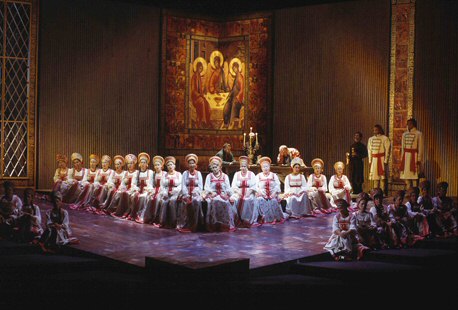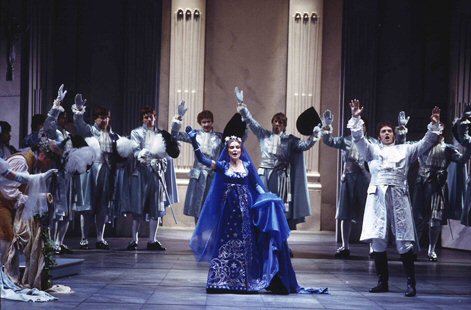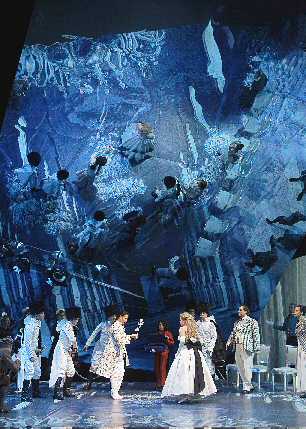|
Editor: Marc Bridle
Webmaster: Len Mullenger
|
Seen and Heard International
Opera Review Rossini, Mussorgsky and Strauss at Finnish National Opera: La Cenerentola, Khovanshchina and Der Rosenkavalier 28th-31st December 2004 (BK) FNO’s
traditional post-Christmas week of performances is typically a joyous
affair rounding off the holiday season with a New Year’s Eve Gala
that includes fireworks over Given these circumstances, the revival of the 2002 La Cenerentola (28th December) was particularly uplifting. Michael Hampe’s original direction, realised for this performance by Kim Amberla and Timo Paavola, was tight, pacy and above all very funny, and when coupled with Markus Lehtinen’s spirited conducting, it provided an evening of true Rossinian pleasure. Stage sets were by Hampe’s long-time associate, the late Mauro Pagano and were all bounded by a simple false proscenium arch over which the opera’s subtitle, La Bontà In Trionfo was displayed prominently. Rotatable side panels and equally simple back-drops made for quick and effective scene changes between Don Magnifico’s home and Don Ramiro’s palace and a good deal of fun was provided by the elaborate mechanical horses and carriage that romped across the back of the set from time to time. Less well
known outside of South
American tenor Juan José Lopera, singing Don Ramiro in this, his FNO
debut, seems likely to become a firm favourite as his reputation develops
further. His is a fine lyrico which has already earned him roles in So then
to Don Magnifico, in the appropriately fine figure – (No, he’s magnificent
and manly, my wife insists) - of Juha Uusitalo. An extraordinary Wotan
in the FNO Ring
this year, and a commanding and menacing Scarpia in Sakari Oramo’s
concert-performance Tosca
in

Khovanshchina. Picture by Stefan Bremer
Mussorgsky's sprawling 'national music drama' Khovanshchina (30th December) was left uncompleted at the time of the composer's death in 1881. Although his piano score contained some indications of instrumentation, Acts II and V were never finished, leaving Rimsky-Korsakov, Ravel and Stravinsky subsequently, and finally Shostakovitch in 1958, to produce orchestrations and various solutions to the problems left by the unfinished acts.
This production, given first like Cenerentola in 2002, uses the Shostakovitch orchestration with new endings to the unfinished acts specially composed by Mikko Franck, whose appointment as FNO's next General Music Director (2006-2011) was announced earlier this year.
Under the baton of Eri Klas, this realisation sounded extremely successful musically. The solo cast is large, but the work also requires substantial orchestral and choral forces, all of which Mr. Klas handled with assured deftness. Everything was exactly in place the whole time, the score moved along nicely with carefully gauged tempi and dynamics and the balance between the various choral passages and the demanding solo parts was preserved skilfully. Some of this music is extremely loud, and great care is needed to ensure that solo voices (however powerful) are not overwhelmed.
The work is difficult dramatically however. In more than three hours of action, it deals with the conflict between the reform-minded Czar Peter the Great, and the conservative streltsy, a band of ill-disciplined troops opposed to change and led by Prince Ivan Khovansky. A religious sect called the Old Believers complicates matters since they are not only opposed to reform also but consider Peter to be the Anti-Christ. The relationship between Khovansky's son Andrei and Marfa, one of the Old Believers, links the two opposition groups.
The plot explores how an anonymous letter from the Boyar Shaklovity prompts the Czar to attack and eventually defeat the Khovanskys, the streltsy as a whole and also their ally Prince Golitsyn, a former lover of Princess Sophia, the conservative regent to the young Czar. In the face of the irresistible power of the Czar after Ivan Khovansky is killed, the Old Believers are persuaded by their leader Dosifei to burn themselves to death as an act of salvation and simultaneous protest against the Czar's reforms. Andrei Khovansky joins Marfa and the other Old Believers in their communal sacrifice.
Directed by Juha Hemánus, with set and period costume designs by Anna Kontek, this production is firmly rooted in the Russia of the 1680s. This choice seemed a wise decision since the story contains a wealth of detail about tradition and motivation and is made more difficult to understand than it might be, because the Czar himself never appears within the action. When the libretto was written, stage representations of the Romanov family (including Czar Peter) were illegal and so the Czar's point of view can be told only second-hand by either his supporters or opponents. Despite the fact that in this production the Czar was allowed to appear briefly at the end of Act IV to pardon the defeated streltsy, this is difficult theatre requiring careful control to sustain cohesion and interest. It did.
This was a second evening of fine singing from FNO. In another debut performance, St.Petersburg principal Sergei Aleksashkin was a fine sonorous Khovansky, while FNO principals Esa Ruutunen (Shaklovity) Laura Nykänen (Marfa) and Jyrki Anttila (Andrei) all gave authentically Russian sounding performances under Eri Klas' able musical direction. Jyrki Korhonen as Dosifie was particularly impressive, his true bass voice sounding firmer and more resonant than ever. And true to form, the FNO chorus was as musical, effortlessly powerful and disciplined as I have ever heard them. They, as much as any of the soloists, made the evening a resounding success.
Der Rosenkavalier. Picture by Heikki Tuuli
The new Rosenkavalier (December 31st, first performance 26th November) really should have been a winner since it had almost everything, truly beautiful sets and lighting by Marco Arturo Marelli (of which more later) and a dazzling array of soloists including Soile Isokoski as the Marschallin and Monica Groop as Octavian. The performance also had the remarkable Austrian bass Walter Fink as Ochs, drafted in at short notice but singing the role as if born to it. Unfortunately though, the evening had a fatal flaw: something very odd indeed happened in the pit under Muhai Tang's direction.
Muhai Tang is the current Musical Director of FNO and to be entirely fair, it is obvious that even he can have a bad night. This might well have happened on New Year's Eve, but the fact remains that the orchestra (the same orchestra that played so perfectly in Rossini and Mussorgsky) produced faulty ensemble a good deal of the time and were so relentlessly loud and rushed that the singers (including the powerful Mss. Isokoski and Groop) were barely audible in some passages. Worse than this though was the shock of hearing both the 'Presentation of the Rose' scene (spine tingling in almost any other performance) and the wonderful Hab' mir's gelobt trio in Act III sounding... well, just dull. No magic, no beauty, and no sense whatever of Strauss's love affair with the female voice. It was terribly disheartening.
But the production is excellent. The sets in all three acts have a large suspended mirror hanging at 45 degrees to the vertical over the stage in which reflections of the painted floor below can be clearly seen. When coupled with Mr. Marelli's splendid lighting and his full use of the stage's capacity to move slowly from right to left so that furnishings magically appear and seem to move themselves, the sets and action look wonderfully sumptuous, not to say genuinely beautiful. These are easily the best sets around anywhere just now.
The singing was good too, when not swamped by the orchestra. Soile Isokoski was a dignified and wise Marschallin, nowadays an expert Straussian and clearly very much at home with this music which she sang with obvious respect and affection. Monica Groop's Octavian matched her wonderfully well and brought a good deal of carefully judged humour to her portrayal of Mariandl as well as showing real tenderness in her love music with Sophie, sung on this occasion by Tiina Vahevaara, a young and fresh voiced soprano who has properly attracted prestigious awards for her singing in Finland over recent years.
From the moment of his first entry, Walter Fink as Ochs left no doubt whatever that his perfomance would be first rate. A big man both physically and vocally, he did something unusual with the role; while every inch of him was the arrogant oaf that the character demands, this Baron also showed an unusual delicacy of movement and vocal expression which revealed the aristocratic heritage of which he boasts so often but of which we are rarely aware. Behind all the bluster a Cavalier was in there somewhere.
Sauli Tiilikainen (Faninal), Juha Riihimäki (Valzacchi) and Tiina Pentinen (Annina) were all in their customary good form and Mika Pohjonen's singing as the Italian tenor (in dark glasses and with a white cane on this occasion) was a particular pleasure. A pity about the conducting though.
Bill Kenny
Back to the Top Back to the Index Page |
| ||
|
||||




